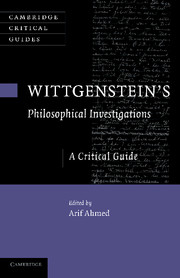Book contents
- Frontmatter
- Contents
- List of contributors
- Acknowledgments
- Introduction
- 1 From referentialism to human action: the Augustinian theory of language
- 2 What's doing? Activity, naming and Wittgenstein's response to Augustine
- 3 Measure for measure? Wittgenstein on language-game criteria and the Paris standard metre bar
- 4 Wittgenstein on family resemblance concepts
- 5 Wittgenstein on concepts
- 6 Wittgenstein vs contextualism
- 7 Wittgenstein and the linguistic turn
- 8 Rorty's Wittgenstein
- 9 Are meaning, understanding, etc. definite states?
- 10 Another strand in the private language argument
- 11 Deductive inference and aspect perception
- 12 Remembering intentions
- Bibliography
- Index
Introduction
Published online by Cambridge University Press: 06 July 2010
- Frontmatter
- Contents
- List of contributors
- Acknowledgments
- Introduction
- 1 From referentialism to human action: the Augustinian theory of language
- 2 What's doing? Activity, naming and Wittgenstein's response to Augustine
- 3 Measure for measure? Wittgenstein on language-game criteria and the Paris standard metre bar
- 4 Wittgenstein on family resemblance concepts
- 5 Wittgenstein on concepts
- 6 Wittgenstein vs contextualism
- 7 Wittgenstein and the linguistic turn
- 8 Rorty's Wittgenstein
- 9 Are meaning, understanding, etc. definite states?
- 10 Another strand in the private language argument
- 11 Deductive inference and aspect perception
- 12 Remembering intentions
- Bibliography
- Index
Summary
Philosophical Investigations is thought by some to be the greatest philosophical work of the twentieth century. It shatters certain images of man that are both deeply embedded within the Western mind and utterly familiar to it. It profoundly alters one's conception of thought, consciousness, sensation, linguistic understanding and the self. It is probably the most powerfully disturbing work of philosophy to have been written since Hume's Treatise. It is among the intellectual monuments of our age.
In it Wittgenstein returns to the themes that had dominated his earlier Tractatus Logico-Philosophicus (1921), i.e. logic and language. That work was largely constructed during the First World War but it was built upon intellectual foundations that had been laid during Wittgenstein's initial study of philosophy, under Russell at Cambridge from 1911 to 1913.
The Tractatus has correctly been described as amongst the strangest books ever written (Coffa 1994: 140). To judge by the space devoted to these questions in the book, it is primarily an attempt to explain the nature of logic and linguistic representation. To these questions we may summarize Wittgenstein's answers thus: sentences represent reality in an essentially pictorial manner (TLP 2.1ff.). Logic does not itself describe features of reality; rather it is an inevitable by-product of the pictorial mechanism (TLP 6.124). But what made the book peculiar as well as notorious were the sweeping conclusions that Wittgenstein drew about the nature of reality (i.e.
- Type
- Chapter
- Information
- Wittgenstein's Philosophical InvestigationsA Critical Guide, pp. 1 - 10Publisher: Cambridge University PressPrint publication year: 2010

